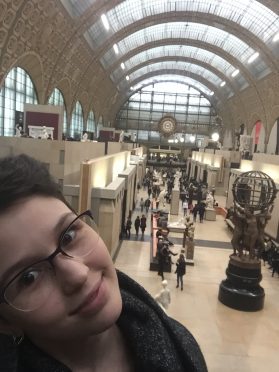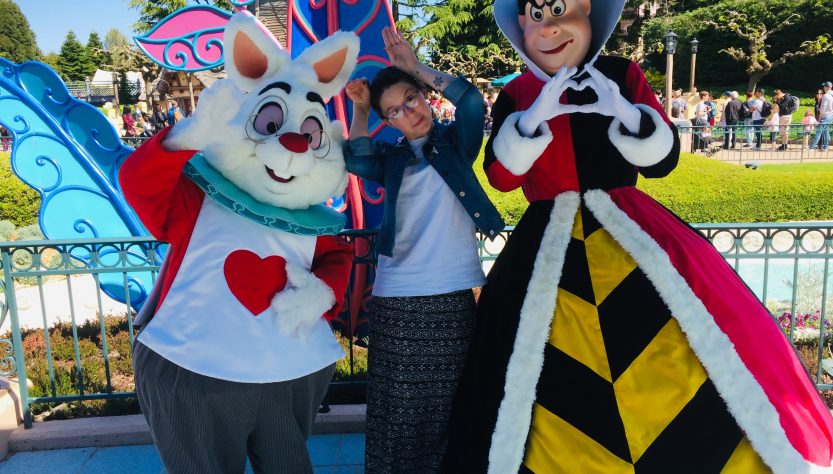My experience travelling abroad on a semester exchange programme differs slightly from the norm in that I did not apply for the exchange opportunity through the international office at SU. Rather, I had previously applied for a second semester exchange programme through the SU English Department, which I had hoped would see me spend the second semester of 2018 abroad studying at UPEC, in France. When my initial application was unsuccessful I fully expected to have to wait until the second semester of 2019 for the opportunity to apply to roll around again. Imagine my surprise when, in September of 2018, I received an invitation from the English Department to take up the exchange opportunity in the first semester of 2019; meaning I ended up attending UPEC for what was their second semester; from January until June of 2019.
Pre-departure:
Receiving the invitation unexpectedly in September meant I very quickly had to shift gears mentally and start getting the heaps of admin that a semester exchange entails organised and submitted to the various parties involved in assisting me in taking up this once in a lifetime opportunity.
In order to keep track of all my paperwork, and the dates for my visa appointment, etc. I made use of a personal Trello board. I would definitely recommend Trello to any and all students, whether taking up an exchange opportunity or not. Trello allowed me to set deadlines, make and complete checklists and keep important information accessible in a way that a paper diary simply can’t. I had the Trello app on my phone, so all my important deadlines, tasks and notes were literally always at my fingertips, and I could check tasks and other items off my lists in real time as I completed them. I kept this board running for the duration of my exchange and used it to save important contact details, to note exam dates and project due dates and you can even use your Trello board as a means of keeping your family and friends updated on your schedule and what you’ve got going on overseas as you can invite them to view your board, meaning they can see what you’ve got scheduled and what you’re up to at any given time without you having to send group texts or update everyone individually.
Though I’m fairly confident I was a pain in the butt of everyone helping me to prepare for my departure, including but not limited to Sarah in the international office here at SU, and the representatives from UPEC that I had been put in touch with, I managed to get all my paperwork and documentation in order fairly quickly, and didn’t need to delay my visa application unnecessarily.
Applying for a study visa from France is, thankfully, super easy, and all the paperwork you need to complete and bring with you to your visa appointment is available online. Once you have downloaded and completed this paperwork, you can make your own appointment to visit the visa processing centre (CAPAGO) for France in Cape Town. (Note, you do not apply at the embassy or via the consulate. Visa applications for France are processed only through CAPAGO centres in Cape Town, JHB and Durban). I was pleasantly surprised upon my visit to the visa processing centre to learn that I did not even have to pay for my French visa application as I was completing my semester abroad exchange as an Erasmus+ Mobility Grant Recipient.
Also worth noting in terms of the visa application process is that you need to leave at least 4 weeks for them to process your application – In the end I think I applied for my visa about 8 weeks before my date of departure because I am pedantic and admin-obsessed and wanted to get it out of the way as soon as possible. I think they ended up taking only 8 or 9 days to return my passport to me with my special “temporary residence”-type student visa inside! Don’t be shocked if you receive a call from somebody at the embassy while waiting for your application to be processed – I did! In France, if you are going to be staying for longer than 6 months, you need to complete additional paperwork and register your arrival with local authorities when you get there. However, if you are only going to be staying for less than 6 months (but more than 3) you do not need to complete this paperwork upon arrival in France. A very nice lady from the embassy called me to ensure I was happy to have the 6-month limited visa, saving me the additional paperwork and effort of registering my arrival. Knowing I was only going abroad for the semester, I opted for this 6-month limited visa, as opposed to the 12-month student visa which requires you to report to the local authorities to complete more paperwork and, I believe, medical tests upon arrival. French bureaucracy is tricky enough to navigate here in South Africa where everyone is able to assist you in English, never mind in France when you don’t speak French! I was very grateful to the embassy for calling me to make sure I only intended to stay for one semester, as the limited visa they then issued me with saved me a lot of unnecessary stress upon arrival.
The final item on my personal to-do list pre-departure was to complete a draft of my thesis from beginning to end. Knowing I was going to be spending 5 months in Europe, I wanted to ensure I had as much free time to explore as possible, and so I wanted to have at least a first draft of my thesis submitted to my supervisor by the time I left. I finished and submitted this draft for my supervisor’s review in mid-December, and we kept in touch via email during my time in France.
Experience at Host University:
Speaking of communication, I spoke only a handful of French words and a few phrases before I left Cape Town on New Year’s Eve 2018. Upon arrival in France and following my official registration and the welcoming/orientation day at UPEC, all international students were invited to participate in a language placement test in order to be placed into French language classes at the appropriate level. I explained to the examiner that a written test would be wasted on me, as I spoke no French and would have to leave it basically completely blank. The examiner ultimately let me forgo the exam and join the A1 French class, which was one of my favourite classes at UPEC. I had French class once a week, for three hours at a time (after hours on a Tuesday night) with other A1 French students from all over the world, including Korea, Serbia, Ukraine, Moldova and more! Being in such a comparatively multi-cultural learning space was very beneficial not only to my personal growth, but to making friends and connecting with other individuals, as I experienced my classmates in my English classes at UPEC (who were predominantly, if not all French) to be less interested in socializing or making friends with exchange students. Being the only exchange student from your country at the host university can be a very isolating experience, so the opportunity to connect with students going through the same thing was very valuable to me.

I think as locals we underestimate just how world-class Stellenbosch University really is. Comparatively, UPEC was underdeveloped. Their campus libraries are far smaller, their classrooms are sparse, and you have to fight with all the other students for access to one of only a handful of computers available in the library whenever you want to print something. Though their resources were limited compared to Stellenbosch, UPEC did have world-class teachers, some of whom I had the pleasure of learning from during my time there. I took two M-level courses during my exchange, as well as one third-year level course (in order to make up the prescribed minimum number of credits to satisfy the terms and conditions of my Mobility Grant, and because only 2 courses at M-level were taught in English), as well as an A1 French language course. The academic programme I followed had far fewer assessment opportunities than similar programmes at Stellenbosch, which meant that your final achievement mark would be the average of only two marks, so you had to perform when it counted or risk a bad final grade. Ultimately, however, as an MA English Literature student at SU working on a thesis, all the credits I earned at UPEC taking classes are simply extra-credit. And, while I was initially excited to learn about subjects that are not necessarily focused on here at home, such as the American Civil War and the Anglo-Scottish Union of 1707, I was equally excited to return home to Stellenbosch and the university’s amazing facilities; especially the library’s cosy Research Commons, for which I found no equivalent at UPEC during my time there.
Return to Stellenbosch:
Frank Baum said it best: “there’s no place like home”. After five months in Paris I missed South Africa, and the ability to greet strangers on the sidewalk (which is simply not done in Paris). Still, returning to South Africa, and to SU has been bittersweet. This semester abroad afforded me the opportunity to travel to far-off places I’d never dared dream I’d reach, to grow, and to discover new facets of myself, including skills and talents I didn’t necessarily have the opportunity to discover or to put to good use here at home. I traveled solo to places like Poland, and Switzerland; something I never thought I’d do. I saw the Northern Lights in Iceland, I learnt a new language (at least, in part; although I do plan to continue with French lessons here in SA), I visited Disneyland Paris not once, but twice, and although I can’t say I made very many friends along the way, I did learn how to be by myself, and to be content in my own company, which I consider invaluable personal growth and one of the greatest lessons my time abroad has taught me. So, while I was sad to leave Europe and the life I had carved out for myself there, I was also excited to return home, to complete work on my thesis, and, hopefully, to graduate in December with my MA in English Literature.
I’d never dared dream I’d reach, to grow, and to discover new facets of myself, including skills and talents I didn’t necessarily have the opportunity to discover or to put to good use here at home
I will forever be grateful to my mentors and the staff in the Stellenbosch University English Department for affording me this incredible opportunity, to the lecturers and staff at UPEC who warmly welcomed me, and, finally, to the SU international office, and in particular to Sarah, who always made sure I was being well taken care of abroad.

